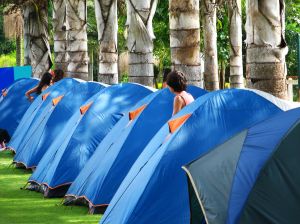C
Camping is an extremely good way for pensioners to enjoy a holiday without incurring enormous expense, and in terms of value, is probably second only to being sent to prison or elected as a member of the European parliament.
If you’re travelling by car, almost all of the essentials can be packed into the boot, while for those who prefer cycling or walking, a pair of rucksacks suspended from a traditional yoke will easily accommodate all the necessary equipment.
According to the British Camping Federation, the most important equipment to take is:
Tent; sleeping bag; folding spade; billy cans (1 large, 1 small); cow repellent; folding chair; Baby Belling electric cooker with four miles of flex; one small crate of sausages; folding shoe tidy; double-barrelled shotgun and ammunition; folding fridge; owl call.
The tent is probably the single most important item and should obviously be weatherproof and preferably quick and easy to erect. Self-inflating tents are available, though you may need the help of a large cow or shire horse to deflate it before leaving. Many pensioners make their own tents, either by quilting old waxed jackets or spot welding sheets of corrugated iron, and the BCF provides a helpful instructional guide to making tents from egg boxes, wallpaper pasting tables and starched handkerchiefs.
Under the 1954 Countryside Act, campers are allowed to pitch their tents on any area of grass larger than 12 sq yds (10.03 sq mts). However, the BCF has established a voluntary code of good practice whereby its members refrain from camping on municipal bowling greens or digging latrines and lighting large fires in pensioners’ gardens.

